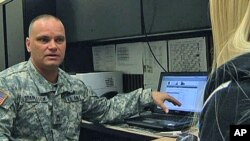It is not a short term problem because high unemployment rates are causing many qualified people to join the military. But retired generals and admirals say if the problem continues, national security could be in jeoperdy when the economy improves.
Staff Sgt. Terrence Pugh's isn't fighting in a war zone. But on this college campus, his mission is anything but easy.
Pugh is looking for new Army recruits. He says many people consider the military when they have no other options.
"Most people are not really interested in joining any branch of service really until life gets them in a bind," he said.
Vernika Givens is a single mom and unemployed. The Army offered Givens and her daughter a future.
"Medical benefits, a steady paycheck. I can get college money and I can save some money for her when she gets older," Givens said.
Givens is one of only a small group of Americans who qualify for the military.
The Army says seven out of 10 people who apply cannot pass a reading and math test.
A report released by Mission Readiness, an organization of retired military leaders, finds 75 percent of young Americans between 17 and 24 are unfit for the military.
The reasons: they did not graduate from high school, have a criminal background or are physically overweight and out of shape.
Mission Readiness says the military is currently meeting if not exceeding its recruitment goals largely because of the economic downturn. But many retired generals fear that there may be a shortage of qualified recruits when the economy improves.
"Our national security in the year 2030 is absolutely dependent on what's happening in pre-kindergarten today," Retired Navy Rear Admiral Jamie Barnett said.
Barnett says research shows children enrolled in a quality pre-kindergarten program raises their high school graduation rate by 44 percent.
"Those are the most sensitive years of their life, the years when you can really get them socially, emotionally, physically, any skill you want with them to make them a child who can succeed," Ricky Gleen said.
Gleen teaches at an early childhood development school called Centro Nia in Washington. He says students drop out of school and get in trouble with the law because they lack problem solving skills and self-esteem.
The Mission Readiness report finds students who do not get a quality early childhood education are 70 percent more likely to be arrested for a violent crime by the time they turn 18.
Gleen says every activity here teaches skills to help students make better life choices.
"They have a sense of self. They have a sense they can make it. They have a sense that they can solve problems," he said.
Gleen's school also teaches students the value of education, how to eat right and exercise.
The goal is that they can continue to apply what they have learned here when they get older.
Some of them may even decide to join a high school Junior Reserve Officers Training Corps class like this one.
"I really like the sense of team and leadership and friendship," Jamie Whitaker said.
Whitaker has good grades, is on a swim team and plans to join the U.S. Air Force.
The military wants to see more possible recruits like Whitaker. And the retired military leaders with Mission Readiness are pushing Congress for one billion dollars a year for up to 10 years to fund more early childhood development programs.
"It is a long term investment," Arne Duncan said. "It is not something that pays off overnight. It is absolutely the right investment we can make."
Duncan is the Secretary of Education. He adds, if nothing is done, America's national security will be at risk.





